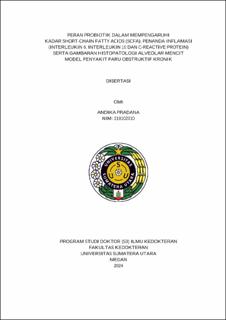| dc.description.abstract | Introduction: Systemic inflammation that occurs in chronic obstructive pulmonary disease (COPD) results in multimorbidity and decreased quality of life of patients. However, current standard treatment with inhaled bronchodilators focuses more on reducing symptoms and local inflammation in the airways only. Probiotics and their metabolite products, short-chain fatty acids (SCFA) have the potential to reduce systemic inflammation through the gut-lung axis pathway. This pathway reflects bidirectional communication between the lungs and intestines, meaning that probiotics also have the potential to reduce lung damage due to COPD. This study aimed to identify the role of probiotics in affecting serum IL-6, IL-10, CRP levels through their metabolite products (SCFA) and their impact on alveolar tissue damage in mice model of COPD.
Methods: A total of 30 C57BL/6 mice were used in this in-vivo experimental study, then randomized into 5 groups. All mice, except the negative control (KN group), were exposed to cigarette smoke for 12 weeks to induce the occurrence of the COPD model. At the 6th week of exposure, mice were then given inhaled bronchodilators (P1), oral probiotics (P2), or a combination of both (P3) for 6 weeks, except for the positive control (KP). Serum IL-6, IL-10, and CRP levels were examined by ELISA. SCFA levels were measured using gas chromatography from caecum digesta. Alveolar tissue damage was assessed by histopathological examination.
Results: Probiotics effectively increased SCFA levels, especially butyric acid in the COPD mice model compared to the positive control (6.6 vs 1.2 mMol/L, p<0.01). Probiotics were also found to effectively reduce serum levels of the proinflammatory cytokine IL-6 compared to the positive control (13.5 vs 19.4 pg/mL, p=0.01), even approaching levels close to the negative control (13.5 vs 13.0 pg/mL, p=0.84). Probiotics were not shown to affect CRP levels or the anti-inflammatory cytokine IL-10 (p>0.05). Probiotic administration was shown to be able to reduce the area of alveoli, the alveolar destruction index quantitatively (p<0.01), and reduce small airway fibrosis qualitatively. Among all types of SCFA, butyric acid was shown to be the only one that was negatively correlated with serum IL-6 (r=-0.42, p=0.02), indicating that as butyric acid levels increase, IL-6 levels will decrease.
Conclusion: Probiotics, through their metabolite products, especially butyric acid, have been shown to effectively reduce systemic inflammation and minimize pulmonary damage in COPD mice model and thus confirming the existence of Gut-Lung Axis theory. | en_US |


